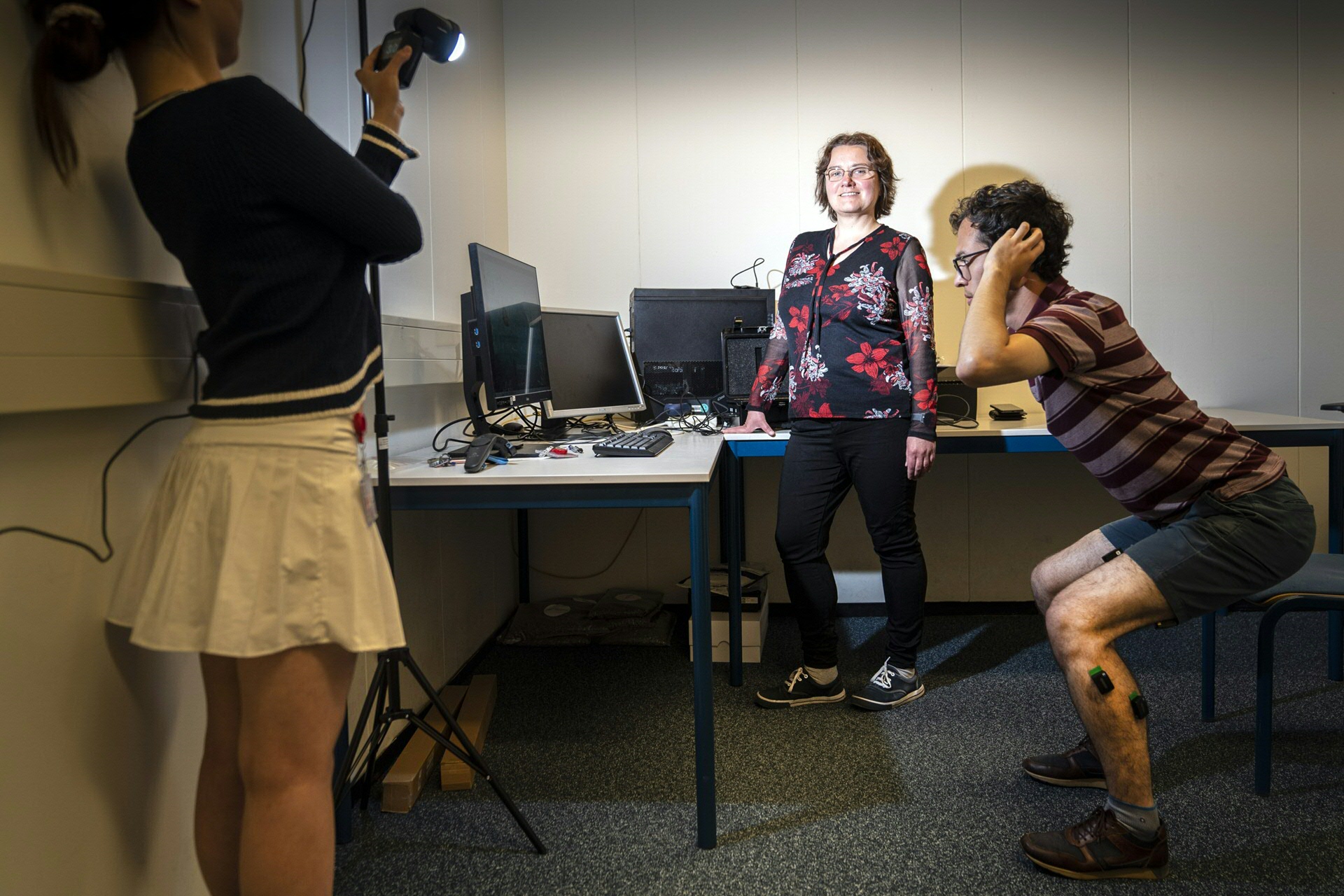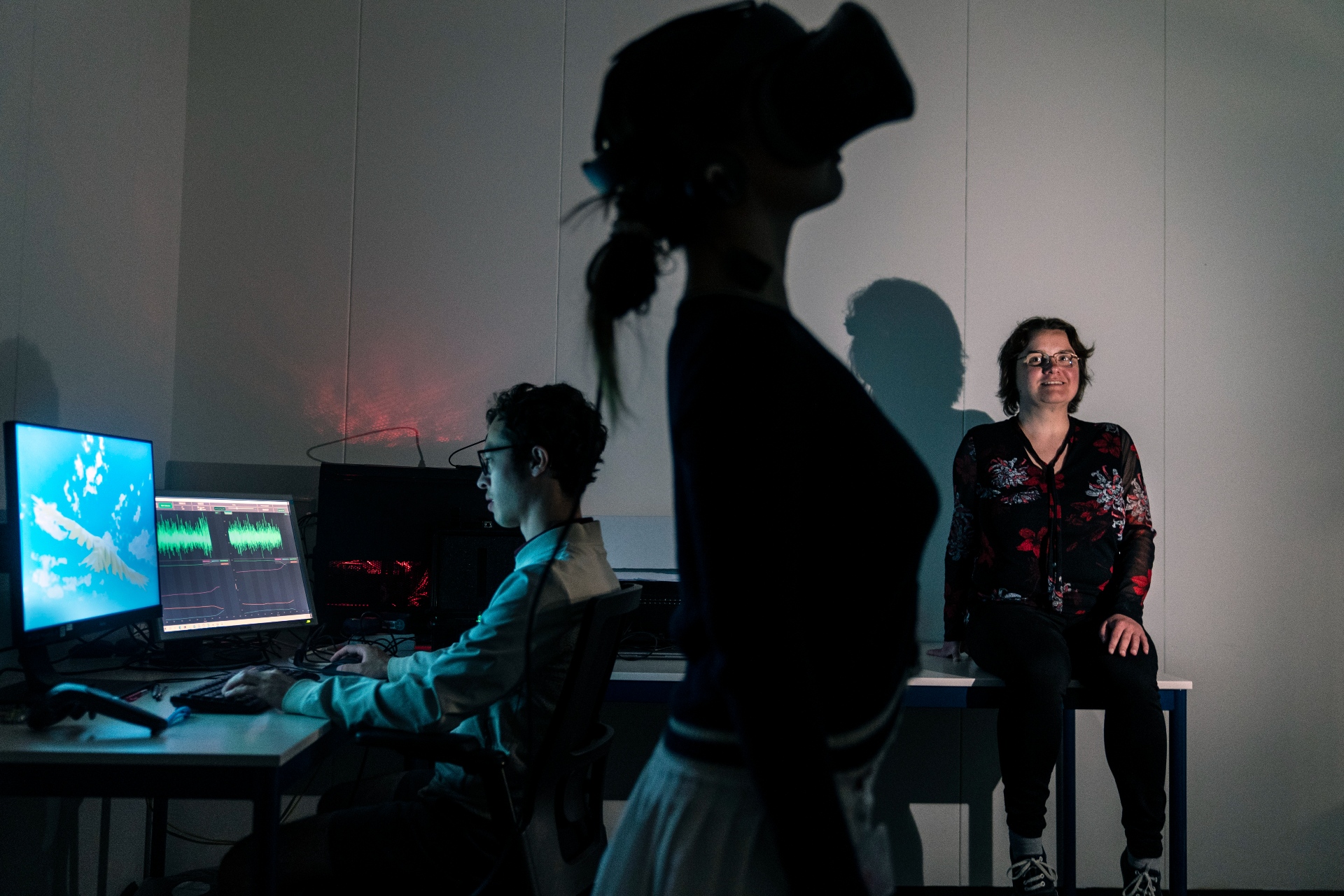Rehabilitation through virtual reality games
Digital Health Care Technologies, also known as eHealth, could drastically change the field of healthcare. The combination of Virtual Reality, Augmented Reality, wearables, telehealth, telemonitoring, and Artificial Intelligence is opening new doors for personalized care, improved patient involvement, and more efficient treatments. The Jantina Tammes School supports researchers who are continuing to develop these technologies, in addition to playing an active role in the collaboration between care providers, policymakers, and industries in order to maximize advantages for patients.
The school is collaborating with Dr Elisabeth Wilhelm in the development of human-centred medical equipment. Wilhelm is an Assistant Professor of the Control of Robotic Systems for Assistance and Rehabilitation in the Faculty of Science and Engineering at the University of Groningen. Conventional medical equipment applies the same type of therapy to everyone. In many diseases, however, symptoms vary over time, as is the case with sleep-related breathing disorders, like sleep apnoea. Patients with this condition often stop breathing at night, particularly when they are lying on their backs. One common recommendation is therefore to tie a ball to the back. This is so uncomfortable, however, that most patients stop doing this within six months. In collaboration with ETH Zurich and University Hospital Zurich, Wilhelm is developing beds that users can reposition whenever they are at risk for apnoea. For this project, machine learning is being developed based on algorithms with which the beds can detect whether patients are likely to stop breathing or, for example, whether they are lying on their backs.

Open House of Connections 24 June
During the opening of the House of Connections, Wilhelm will present VR games for knee and neck exercises, which visitors can also try. The games challenge people to be more active, despite their complaints. Whether at home or at work, the exercises can be done in a pleasant and motivating manner.
‘We would like to help people supplement physiotherapy with home training’, explains Wilhelm. ‘For example, a patient receives physiotherapy after an operation. In many cases, this is limited to one session a week. The therapist is likely to tell patients that they will also have to exercise at home in order to recover. One challenge in this regard is to stay motivated’.
Virtual motivation to exercise
The exercises that patients have to do for physiotherapy are not very exciting, and they can even feel uncomfortable. Humans are quite good at developing other strategies to achieve the same goal (i.e., ‘compensatory movements’). Such compensatory movements can be useful (e.g., to continue to be able to perform activities of daily life). Repeating exercises in the wrong way multiple times can nevertheless lead to problems. Patients are often not aware that they are actually not performing the movement that the therapist has asked them to do.
The computer games that Wilhelm’s PhD students are developing motivate people to do their physiotherapy. One of the games was developed for people with cervical dystonia. These patients have problems controlling the muscles in the neck. They can use a VR game to practise this. In the game, they guide a bird. To avoid obstacles, they have to change the position of their head. During the game, sensors measure the position of the head and the exertion of the muscles.

Immediate feedback
Wilhelm explains, ‘To help people with these challenges who would like to train at home, we are developing what is known as ‘serious games’. These computer games motivate people to do their exercises. By using sensors to capture the patient’s movement, we can also provide immediate feedback. Patients cannot succeed in the game by making compensatory movements. If they are making progress and getting better, however, it becomes more challenging’.
The second game was developed for people who have had a knee replacement. They have to learn how to walk again. To do this, they have to be able to control the knee well. To practise this, a small sensor is attached to the leg. It is used to control a fishing rod in the game. If the fishing rod is brought to the right height, the player catches the fish and receives a point. ‘In both games, we use sensors that continuously measure how well the patient is performing the exercise. This makes it possible to coordinate the difficulty of the game to the individual needs of patients’, notes Wilhelm.
Adjusting homework
The information registered by the sensors can also tell therapists how often patients have been training and which exercises are working the best for them. Based on this information, they can adjust a patient’s ‘homework’ and speed up the recovery. Evaluating the user’s movement quickly enough to allow immediate feedback during the game requires special algorithms. These algorithms use machine learning to assess the user’s position according to the sensor data.
More news
-
17 February 2026
The long search for new physics
-
10 February 2026
Why only a small number of planets are suitable for life
